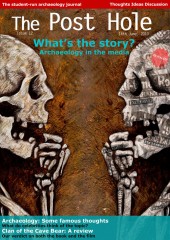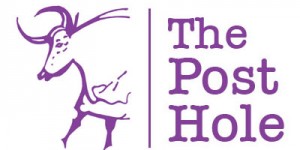In light of this issue being focused on archaeology and the media, we here at The Post Hole thought we'd ask some celebrities for their thoughts on archaeology. Obviously we had a good starting point in that we already knew Eddie Izzard's opinions on the subject, especially when it comes to archaeology on TV;
"I quite like it, it's a sort of detective thing but it's really tricky, you know, it's there. But it's kind of slow on telly. It has this problem of, 'We've been here three weeks on live TV and we've dug up a millimetre of topsoil so far.' It's too slow. Our attention spans are short. We want, not slow archaeology, we want speed archaeology. 'You've got minutes to find a city!' 'All right! Let's go! Get the diggers in! Get that skull out of the way! Pottery everywhere!' And they always find in archaeology, a series of small walls. Every time, a series of small walls. 'We found a series of small walls, we're very excited. We think this proves that they had walls in olden days.' And then someone, very learned with glasses, says, 'The King and Queen entertained here. Courtiers and soldiers in this room. And elephants dancing hopscotch over there. Mad fiddler in this room, playing the banjo. Viaducts and aqueducts...' And you watch going, 'You're making this up, mate. You just point at a series of small walls and say, 'Tutankhamen played banjo in there.' You don't know if it's true.'" (Izzard 1997).
Following this, Izzard went on one of Time Team's 'Big Dig' programmes in 2003 and had a go at wielding a mattock himself. Unfortunately for him, he ended up digging a test pit and finding nothing but natural clay, but how many of us can't relate to that? I know I can.
Over the last few months, many emails and letters have been sent out by the team to try and find out what other celebrities first think of when someone mentions the word 'archaeology' to them. Detailed here are a few of the responses we received.
BBC Radio 2's Chris Evans and his team came up with "trowel, dinosaur and mud", while Colleen Nolan said, "dinosaurs and ruins".
Hunter Burgan (American musician and bass player for the band 'AFI') told us: "I think of the DIG project I worked on in 6th grade. It was an archaeological/anthropological assignment where the students broke into two groups, created artefacts that reflect every aspect of a fictional civilization and buried them in the woods for the other group to find. It was a blast. Some of them are probably still buried in the woods. I wonder what future civilizations will think if they ever find those artefacts."
However for some, the first thing that they appear to think of when someone says 'archaeology' to them is themselves. For example, in their replies to us, David Tennant and Noel Fielding both sent signed photos of themselves and, while we're obviously grateful for those, academically we're not too sure we'd agree that they accurately represent archaeology!
Without doubt our most in-depth response came from our recently re-elected Labour MP here in York, Hugh Bayley, who has a long-standing interest in archaeology which has influenced some of his political work. He told us:
"I would have been seven or eight when I went with my sister, Justine, who was two years older, to 'dig' a Roman villa at Cox Green. We were given a little pit to play in, on the corner of the site. I still have a grey shard of 'Roman' pottery which I found. Justine went on to a lifetime's work at English Heritage's Ancient Monuments Laboratory. She analysed many of the inorganic finds from the York Archaeological Trust's Coppergate dig, and has just retired. I veered away from archaeology into politics. As a young boy I was fascinated that archaeologists could examine a broken piece of pottery and be able to date it and make a drawing of what the complete pot would have looked like and how it would have been used. As I got older I realised there was more to archaeology than just broken pots. By studying artefacts and remains we get an insight into how we have altered as people, as a society and how we have changed the environment we live and work in. Living in York has increased my interest in archaeology.
York has a unique uninterrupted history of human habitation covering two thousand years and we need archaeologists to painstakingly uncover and preserve our history. I meet regularly with representatives from the York Archaeological Trust and the Council for British Archaeology which is also based in York to discuss their current projects and any issues they are concerned about. For example we met recently to discuss the draft Heritage Bill which proposed revoking the Area of Archaeological Importance designation. York is one of just five places in the country designated as an Area of Archaeological Importance and the designation requires archaeological assessments to be made before the utility companies are allowed to dig up the roads. I took a deputation of archaeologists to Westminster to see the Culture Minister about this issue, and she agreed to keep the designation.
I am a member of the All Party Parliamentary Archaeological Group and have welcomed members of the Group and government ministers to York to highlight the important work our archaeologists undertake. Archaeology isn't just about the distant past. It is fascinating to see the excavation of the Hungate site unearthing memories of life in one of York's poorest areas at the beginning of the twentieth century, and to meet some of the people who lived there who recognised their old homes and to hear their stories. I was pleased to be asked to write the Forward for Van Wilson's oral history about Hungate. It connects with my own interest in social policy, and Seebohm Rowntree's classic study of poverty in York at the turn of the nineteenth and twentieth centuries. Before being elected as York's MP I spent some time as a lecturer at York University's Department of Social Policy."
So there we have it. For a few celebrities it makes them think back to their childhood (in some cases, a childhood that influenced their adulthood), for others it conjures up images of muddy archaeologists trowelling away in a field somewhere, and for some the word 'archaeology' reminds them of dinosaurs (which, like the signed photographs, doesn't quite accurately represent archaeology, but it's close enough). I would like to take this opportunity to thank all those who took the time to respond to us and let us know what their thoughts are about archaeology, and also for the two very lovely photos that we gained as a result!
Bibliography
- Izzard, Eddie (1997) Glorious, DVD, Universal Pictures UK, 4 October 2004 Time Team (2003) Time Team: Big Dig, TV, Channel 4, 29 June 2003




